Welcome to Slate’s celebration of all the things that went right this year!
Good news is hard to find. One of journalism’s most important jobs is to call out what’s wrong with the world so we know what to fix. But sometimes it’s also a service to show what works, to admire people behaving honorably, to appreciate signs of progress.
In the interactive calendar above, we’ve selected one story for each day of the year that was inspiring, funny, or touching—stories of discoveries, artistic achievements, or improvements in public health.
When you click on one of the days in the calendar, you’ll see a brief description of the story, a link to read more, and an option to vote on whether this item is “Great!” or “Meh.” We’ll keep a running tally at the end of this page of the greatest and meh-iest events of the year.
Some of you may recognize the format from last year, when Slate presented the Year of Outrage. This year’s calendar was much harder to fill in; with gun violence, the Syrian refugee crisis, terrorism, and Donald Trump, the news has been pretty disturbing. That’s one reason I started this package: Not everything that is important is bad.
The collection has a point of view: Progress is good. So are science, diversity, diplomacy, wildlife conservation, funny feminists, international climate agreements, and Justin Trudeau. Progress is often incremental, and sometimes it’s a matter of terrible things getting less terrible: Homelessness, high school dropout rates, and infant mortality are all dropping. Sometimes progress is breathtaking; this year was the best year in history for LGBTQ rights. Some of the events in this collection were forgotten the next day; others will be in the history books.
What did we miss? Please share other achievements worth celebrating in the comments section below or with the hashtag #GoodThings on Twitter. They can be serious or silly. (My favorite item that didn’t fit into the calendar was two llamas that went on the lloose in Sun City, Arizona.)
In the short appreciations below, we’re highlighting 15 of our favorite events from the year. Let’s hope 2016 brings even more discoveries, generosity, wisdom, and rewards for hard work.
— Laura Helmuth
By Phil Plait

Matt Cardy/Getty Images
and NASA
2015 marked a huge step in our exploration of the solar system: On July 15, the New Horizons space probe flew by Pluto and its weird fleet of moons, humanity’s first close-up look at the icy world.
Even getting the spacecraft built and launched was a feat of astronomical can-do attitude, fighting against politics and funding cuts. But it was done in near-record time and sent out in 2006 on a speedy track to Pluto.
The images it sent back this year are stunning. Pluto is really, really strange: It has water ice mountains as tall as the Rockies; smooth plains of frozen nitrogen; a weird series of pits dotting its surface like pores; a heart-shaped region 1,000 kilometers across; and, perhaps oddest of all, blue skies. Its moons are no less bizarre; Charon is half the size of Pluto itself, assembled like a Frankensteinian patchwork, and has a huge red blotch (nicknamed Mordor) at its north pole. The smaller moons may be debris left over from a huge impact that formed Charon in the first place.
And New Horizons isn’t done yet: It’s still moving and in a few years will zip past a huge chunk of ice that will give us our very first view of the source of many comets that grace our skies.
Whether you think Pluto is the smallest planet or the biggest of the icy worlds past Neptune, the brief glimpse we got of it was a gift to astronomers, and to all of us who look up into the sky and wonder about it.
By Dan Kois
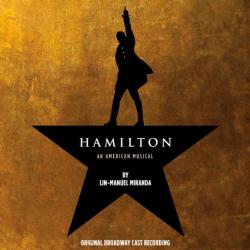
The very idea sounded corny in the extreme: a musical about the Founding Fathers, featuring America’s first treasury secretary rapping about the Revolution. Were we all trapped inside an overenthusiastic middle school history teacher’s pipe dream? What was this, Schoolhouse Rock? The best thing about Lin-Manuel Miranda’s Hamilton—which opened February at the Public Theater in New York before taking over Broadway in August—was the way it overcame every skeptic who resisted it, including me. Yes, it’s easy to imagine ways the musical could have turned out hapless or stupid or oversimplified or really, really pathetic. Instead, thanks to the intelligence of Miranda’s writing and the energy of its talented, diverse cast, the show was a triumph. Like its subject, Hamilton is a little smarter than every other show but still works devilishly hard. The result is a musical that, for all intents and purposes, everybody likes. Young or old, middlebrow or radical, patriot or revolutionary, hipster or square: I’ve yet to find an audience member who wasn’t won over by Hamilton, and I bet it runs for a decade or more. It’s a good and rare thing for a new American musical to achieve phenomenal box-office success; it’s better still that it deserves it.
By Joshua Keating
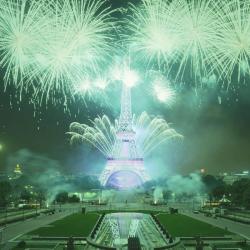
Roman Sigaev/Shutterstock
World politics in 2015 were defined by worsening violence in Syria, Iraq, Afghanistan, Yemen, and northern Nigeria and deepening authoritarianism from Russia to Egypt to Turkey. But it was also a year that saw some tentative but promising diplomatic breakthroughs—instances where years of painstaking and frustrating negotiation finally paid off.
The marquee diplomatic events of the year included the normalization of diplomatic relations between the United States and Cuba after five decades and the international deal reached between Iran and world powers over the Islamic republic’s nuclear program. It will take years to know whether these deals fully succeed, and in both cases, human rights activists rightly called for more to be done to curb these regimes’ abuses. But these deals have the potential to, in one case, bring an end to some of the thorniest unfinished business of the Cold War, and in the other, defuse one of the most dangerous potential flashpoints in a region badly in need of any good news.
The same can be said of the 195-country climate change agreement reached in Paris in December. The commitments in the agreement aren’t enough to stop catastrophic climate change on their own but do represent the kind of international cooperation—particularly between wealthy and poor countries—that seemed impossible six years ago in Copenhagen.
Elsewhere in the world, the Colombian government and the left-wing FARC guerrillas are nearing the conclusion of a peace deal that that could bring to an end one of the world’s longest running civil wars. Myanmar opposition leader Aung San Suu Kyi is working to share power with the former military leaders who kept her under house arrest for nearly two decades. Violence between pro-Russian separatists and the Ukrainian government has diminished in Ukraine since a cease-fire was signed in September, though violations still occur. At the end of 2015, negotiators were beginning to hammer our the details of a cease-fire agreement in Yemen. There are also some very early and tentative signs of international powers coming together to help resolve the bloody and destabilizing conflict in Syria, though a real agreement may be years away.
Striking deals is harder than keeping them of course—the souring legacy of agreements struck decades ago in Oslo or Budapest still hangs over ongoing conflicts today—but we got a number of reminders this year that it’s never too late for even the bitterest of enemies to sit down and hash things out.
By Amanda Hess
Say hello to Twitter’s 2015 MVP. NBA Catwatch is an anonymous cat person who prowls players’ social feeds and paws at basketball beat reporters in his quest to answer one seemingly simple question: Which NBA players own cats? The project officially launched in 2013, but 2015 proved a standout season for the cat watcher, who confirmed cats belonging to Spurs guard Manu Ginóbili (a lithe calico called Apia), Golden State Warriors forward James Michael McAdoo (Macy, a green-eyed rescue), and Memphis Grizzlies guard Russ Smith, whose blue-eyed, pink-nosed kitten, Mr. Quackers, was introduced to the world by way of the kitty’s very own Instagram feed.
Few NBA-affiliated felines are so easily cat-watched as young Mr. Quackers. These are cats—they naturally recoil from the human gaze—so on most days, netting a confirmed NBA cat sighting requires stamina, ingenuity, and fastidious attention to detail. After receiving a series of tips that San Antonio Spurs star Tony Parker is a cat man, NBA Catwatch finally caught Parker’s cat, Cece, slinking through the frames of a French documentary. Working off a hunch that Denver Nuggets guard Mike Miller plays basketball like a cat owner, NBA Catwatch flipped back through Miller’s Instagram and fingered a black-bodied, white-footed cat padding into the background of a candid photograph. (The cat watcher himself will reveal only that he’s a 33-year-old Chicago man with two cats of his own, Frankie and B.) Most investigations into players fizzle out with “no evidence of cat ownership / enthusiasm” found.
Too often, the chase concludes with the player publicly announcing his fear or disdain for cats. When NBA Catwatch tweeted at Orlando Magic guard Evan Fournier last month to inquire as to his cat ownership status, Fournier hissed back, “I hate cats sorry lol.” But there’s something sublime about NBA Catwatch’s drive to carve out this tiny sliver of the cultural Venn diagram where professional basketball players and cat people overlap. The NBA-affiliated cat plays against type, and we all win. At the risk of stating the obvious: NBA players are boys, and cats are girls. Also, athletes travel frequently, and cats only pretend to tolerate humans when they supply food on a regular schedule. Finally, while pro ball players thrive on “order and regimen,” cats “respect no rules, they take no coaching, and they are not team players,” NBA Catwatch told me. “To own a cat, you have to surrender to the chaotic nature of its whims.”
By Aisha Harris
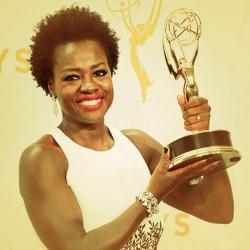
Mark Davis/Shutterstock
A couple of years ago, I wrote about how black actresses continuously get short shrift in Hollywood, especially in comparison with their white female, and even black male, peers. In 2015, however, things have been looking up, on the small screen, at least. Viola Davis, Taraji P. Henson, Kerry Washington, Tracee Ellis Ross, and a few others have all starred in series that allowed them to portray black femininity in a variety of complicated, engrossing, and remarkable ways—no two characters created among them are exactly alike. Perhaps no moment better signified how far we’ve come in just a few short years than when Davis, Uzo Aduba, and Regina King all won Emmys in September. (Henson, Mo’Nique, Angela Bassett, Queen Latifah, and Niecy Nash were also nominated.)
We still have a long way to go before such representation is the norm and not an exception—Davis’ incredible acceptance speech quoting Harriet Tubman is all the proof you need—but at least we’re seeing a noticeable, inspiring shift.
By Ruth Graham
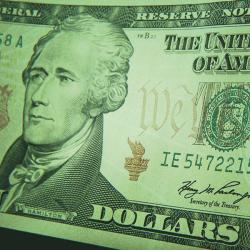
Paul J. Richards/Getty Images
On June 17, Treasury Secretary Jack Lew announced that a to-be-determined woman’s portrait will be added to the $10 bill starting in 2020. The proclamation followed months of clamor over booting slave-owning, anti-paper-currency Andrew Jackson off the $20 in favor a woman. The cumulative effect was a refreshingly robust discussion about which woman deserved the spot (Rosa Parks? Eleanor Roosevelt?), and about Jackson’s and Hamilton’s complicated legacies. You didn’t have to believe that all old white men should be scrubbed from the honor roll of American history in order to find the debate invigorating.
Americans are notorious for forgetting our own history. We routinely ignore our mistakes and keep dooming ourselves to repeat them. But the feisty fight over the $10 and $20 bills was only one of several honest-to-God national conversations about history we had this year. There was Hamilton the musical, Obama’s move to rechristen Mount (William) McKinley as Denali, the pushes to expel Woodrow Wilson and John C. Calhoun from the Ivy League, and the too-late, still-great demotion of the Confederate flag in several Southern states. It was a raucous, righteous year of genuine grappling with our history. Let’s just hope we remember it.
By Rachel Gross
California became the first state to ban the slur redskins for the name of school teams or mascots. Gov. Jerry Brown also signed a law encouraging history classes to teach an often-overlooked period of California history: the Depression-era Mexican Repatriation Act, which led to the forced deportations of more than 1 million Mexicans and Mexican Americans.
A law enacted this summer eliminates most vaccine exemptions for public school students. The new law, one of the strictest in the nation, comes after an outbreak of measles at Disneyland last winter led to greater awareness of the risks of allowing parents not to vaccinate their children.
Californians made major strides toward conserving water. In June, the state exceeded its water-reduction goal by 25 percent. Residents replaced their blazingly green lawns with cacti, succulents, and sand; let their lawns go “California golden” in the summer; and took advantage of government rebates that help “replace inefficient toilets and tear out water-guzzling lawns.” You’re a desert, California: Embrace it!
The California Coastal Commission banned SeaWorld from breeding orcas in captivity. The commission demanded that these “species of special biological significance” be protected and directed SeaWorld to phase out its whale collection and aim for a “Shamu-free future” within 40 years.
Crisis pregnancy centers masquerade as full-service clinics and lie to women about their reproductive choices. The Reproductive FACT Act would force the state’s more than 300 crisis pregnancy centers (many of which receive federal funding) to disclose honest medical information about what services they do or don’t provide.
So thank you, California, for being on the side of light and progress! Maybe now we Californians have done our penance for that Proposition 8 fiasco back in 2008.
By Willa Paskin
Steph Curry, the star of the Golden State Warriors and the best-shooting player in basketball, is the most exciting athlete of the year. And the most delightful thing about Steph Curry? His adorably strong-willed daughter, 3-year-old Riley, the star of every press conference she attends. Riley is how we know her father is mortal and not a jump-shooting basketball bot whose every circus shot goes swoosh, as if the basketball and the hoop were magnets, calling to one another over long distances. Riley Curry, and only Riley Curry, turns Steph Curry into a bystander, just another viewer of the exceedingly entertaining Riley Show. Watch Steph try to answer basketball questions while Riley moves the mic, mugs, or stages a huge yawn: He can’t. Like her father on the court, Riley cannot be denied—not even by an arena employee upon whom she foists her already been chewed gum. Sure, Daddy can do some tricks with a basketball, but have you seen Riley’s moves with a curtain? Magic.
By Rachael Larimore
We got our first good look at the GOP field on Aug. 6, at the first debate. Republicans may have a reputation as the party of old white guys, but the field included African American Ben Carson, Indian American Bobby Jindal, Hispanic Americans Ted Cruz and Marco Rubio, and Female American Carly Fiorina.
One of the many unfortunate side effects of Donald Trump’s candidacy is that his act of performance art has obscured the truly diverse nature of the GOP field. And not just in the inclusion of minorities and women, but ideologically. From the moderate Lindsey Graham to the pragmatic Jeb Bush and John Kasich to the more conservative Ted Cruz, Republicans are having important conversations about the party’s ideas and direction.
Yes, it’s easy to mock the thought of some of these candidates actually winning the primary. Jindal, of course, has already dropped out. Ben Carson, despite his brilliance as a neurosurgeon, believes that the Egyptian pyramids were grain silos. Fiorina mysteriously didn’t capitalize on her early debate victories. The important thing is, these candidates, as well as the ones who seem to fit the old boys’ club stereotype, are being judged not on the basis of their ethnicity or gender but their ideas.
Regardless of who wins the nomination, it’s worth celebrating that in 2015, the Republican field looked like America, warts and all.
By Jamelle Bouie
All the attention heaped on Donald Trump’s quest for the presidency has obscured the extent to which one of the common predictions for the presidential race—that the Democratic nomination would be a coronation for Hillary Clinton—was wrong. Since this summer, Clinton has faced a strong challenge from Vermont Sen. Bernie Sanders, who has rocketed from the margins of American politics to the forefront, as the nation’s most visible—and most popular—socialist.
On Wall Street, on trade, on criminal justice, and on the environment, Sanders has been a tenacious opponent for Clinton, raising millions of dollars and inspiring countless people to “feel the Bern.”
Obviously, reporters are thrilled with a competitive race. But more than good copy, this race is good for the Democratic Party and American politics writ large. Sanders is forcing an intraparty debate over liberal values and showing elites the extent to which there’s a left that exists beyond the contours of the Democratic Party. Sanders may not win the nomination, but he’s shaping the future of liberal politics.
It’s a fascinating development, and one that shows the degree to which American life still holds real surprises for us all.
By Jeremy Stahl

Franck Fife/AFP/Getty Images
WNBA star Becky Hammon made history last year as the first female assistant coach in the NBA. Hammon—an Olympic medalist and six-time WNBA All-Star—has taken the lead among a small but growing group of women who are finally beginning to crack the longstanding gender barriers in men’s pro sports. On July 20, 2015, Hammon made more history by leading the Spurs to the NBA Summer League title in Las Vegas as head coach—the first woman to either win that title or head coach in that league. The Summer League is not the top tier of men’s basketball—it’s mainly for rookies and journeymen. But the fact that Hammon had the opportunity to coach NBA players against other NBA players—and win—was a major step forward for a sporting world that needs every small step it can get. Her victory led to speculation that she could be the first woman to become an NBA head coach. Any day that brings professional sports closer to baseline levels of gender fairness that other industries accepted long ago is a good one.
By Jordan Weissmann

Maxxer/Shutterstock
and LorenzoPatoia/iStock
If you’ve spent much time watching the Republican presidential debates, you might be under the impression that, seven years after the financial crisis, the U.S. economy still looks something like a charred forest floor after a wildfire. Sen. Ted Cruz, the GOP’s foremost purveyor of apocalyptic pablum, put it simply in November: “The Obama economy is a disaster.”
It’s a strange way of describing what is by most measures one of the strongest economies in the developed world. Perhaps that’s faint praise, given the competition. But in a year of market panics, commodity busts, and euro-drama, the United States has added a robust 210,000 jobs per month, as the unemployment rate has drifted down to 5 percent. Wage growth is finally picking up and, once you adjust for inflation, is arguably pretty strong. Housing starts and home prices continued rising through the year. Gas prices stayed low. While much of the globe seemed to be catching a flu (heaven help South America), we took a few more steps toward health.
The economy isn’t necessarily flourishing, mind you. There are too many Americans sitting out of the labor force, too many working part time who would like a full-time job. But it’s worth appreciating the good side. Our national convalescence continued, slowly but thankfully steadily.
By Willa Paskin
Before this year, Taraji P. Henson was a constantly working, Oscar-nominated actress with dozens of credits to her name. Then came Empire and Cookie Lyon. Empire, Fox’s delectable, over-the-top drama about a hip-hop dynasty, is the breakout hit not just of this year, but of this decade. And Cookie is the breakout star of Empire, a charismatic queen who saunters around in animal prints and high heels, making hits while making up for nearly two decades in jail. Cookie would not be Cookie without Henson, who ad-libbed Cookie’s most recognizable put-down—that’s “boo boo kitty” to you—camps it up like the world’s most practiced backpacker, and grounds everything Cookie does in something real. Henson is part of a group of black actresses—Viola Davis, Kerry Washington, Regina King, and Uzo Aduba, among other Orange Is the New Black actresses—who have found the success they deserve in television. Henson is making the most of it, chilling with Washington and Mary J. Blige in the ultimate #squad commercial, getting nominated for an Emmy, and then losing that Emmy—to friend Davis—with so much supportive enthusiasm it was as if, like everything else this year, she had won.
By Laura Helmuth

Carlos Aguilar/AFP/Getty Images,
Wikipedia Creative Commons,
Alexnika/shutterstock
Presidents’ greatest legacies are the lands and waters they protect. Ulysses S. Grant established Yellowstone, the first national park (America’s “best idea”). Teddy Roosevelt preserved more than 200 national forests and other reserves, and George W. Bush created the then-largest marine reserve in the world. And as of this year, Barack Obama has protected more land than any other U.S. president.
In January, the administration proposed designating 12 million acres of the Arctic National Wildlife Refuge as wilderness area. This enhances its protection and prohibits oil drilling. Even though congressional Republicans oppose the official designation, the U.S. Fish and Wildlife Service will manage the area as wilderness for practical purposes.
In February and July, Obama exercised one of the greatest perks of the presidency—establishing national monuments, which do not require congressional approval. The new parks preserve a Hawaii internment camp for Japanese Americans during World War II, the Pullman neighborhood in Chicago, a paleontological site full of Columbian mammoth fossils, and unspeakably beautiful landscapes in Colorado, Nevada, and California.
The most momentous protections, though, have been at sea. Last year, Obama created the largest fully protected marine reserve, breaking George W. Bush’s record, which was then topped this year by the British government’s establishment of an even larger fully protected marine reserve around the Pitcairn Islands. In March, the Obama administration more than doubled a marine reserve off California known as the “blue Serengeti.” Overall, the world protected more territory (mostly marine) in 2015 than during any other year in history.
By Mark Joseph Stern
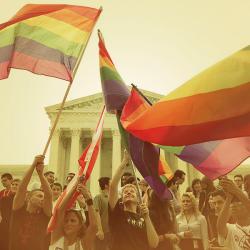
Alex Wong/Getty Images
The Supreme Court’s decision in Obergefell v. Hodges ordering every state to grant same-sex marriages is frequently described as a victory for gay Americans. It was, of course: In a single ruling, the court erased the terrible stigma of legalized discrimination, of second-class citizenship, instantly granting millions of gay people the liberty to participate in the fundamental right of marriage and giving their children the emotional and financial stability of a legally recognized family.
But Obergefell was so much more than that. The decision was also a triumph for a specific vision of the Constitution, and its role in protecting individual rights and disfavored minorities. Obergefell pushed the court to confront the most difficult and enduring questions about our constitutional system. Can the Constitution condone laws that target and disadvantage a certain class of people? Can it let stand laws that are based on religious prejudice? Can our courts sanction an attempt by the majority to disenfranchise an entire group of Americans based simply on their immutable identity? Do the 14th Amendment’s dual guarantees of “liberty” and “equal protection” really apply to every “person,” as the Constitution states—or can voters strip some people of liberty and equality?
Justice Anthony Kennedy’s brave and impassioned opinion for the court answered these questions by looking back in time—back to when some states wished to ban marriages of interracial couples, or to force married women to be legally subservient to their husbands, or to limit married couples’ reproductive autonomy. The court, Kennedy noted, refused to validate these laws, instead choosing each time to expand the freedom to marry beyond its historical (and often bigotry-based) strictures. This case, the justice explained, is really no different. By once again choosing the path of greater freedom, Kennedy affirmed the Constitution’s critical role in safeguarding individual liberty over societal intolerance. It was an epochal moment for the Supreme Court—and for America. Our country will never be the same. Thank goodness for that.
